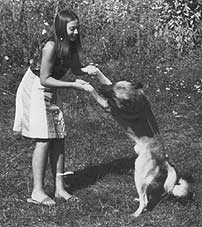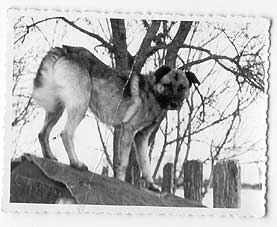As a matter of fact I have only found 2 pictures.


On one Pasa is on its hut and on the other he is with my cousin, who is a little bit shorter than me. On the picture where Pasa is on its hut the date is mentioned: November 1968 and my family told me that he was very young then. The fact is that he does not resemble the Sarplaninci of nowadays and that he is nearly ugly and not harmonious but my uncle who had him in Kosovo said that they were like that at that moment and in that region. My uncle was then an officer in the region of Pristina. He was hunting and knew all the villages and mountains at the Albanian border. Those dogs then fascinated him and this is how he got this puppy from a Goranac as a present. I questioned him to know more details on where he got this puppy. Its story is approximately the following:
“The origin of the Sarplaninac is the western part of the mountain Sara and alongside the Albanian border, region where Goranci (Serbs and Macedonians who took the Islam religion) were living and the villages of Albanian side. From Serbian side it are the following villages: Orcusa, Brod, Restelica and Vraniste. He said that it are “bric” dogs, dogs with short hair, very thick fur, with long legs, with a black mask regarding the muzzle, color of the wolf on a white or yellow base, rarely multicolored, from character – guard dog by instinct, passive outside the zone which they are guarding. They determine the zones themselves. They are very alert and when they follow a human, the eyes are shooting left and right, they are not calm like the Caucasian Shepard, which is not showing such a watchfulness towards the environment”. This is my uncle’s personal opinion, who is not a cynologist and who was never interested in this problem. He said that modern Sarplaninci are much taller, much stronger, but less alive than the original Sarplaninci, which are lighter, taller and very light footed. He also said that the peasants were breeding those dogs with a lot of attention, that they were making a selection and an exchange, that in winter they were keeping their puppies inside the house, together with their children. They were discussing about the breeding and who was taking which puppy. He had an excellent contact with those people and he admired this know-how, about this relation with the dogs so different in our areas. The army was using the Sarplaninac to guard the borders against the illegal crossings on our territory, there where the German Shepard was used to follow the fugitives. When they are guarding the flock of sheep, the Sarplaninci are putting themselves at the same distance of each other and they are lying. They are not paying attention to people who are approaching the flock from far away, but if you are approaching the sheep, the dog which is the nearest will get up and will go towards you. He said that he liked to experiment this and when he was stopping, the dog was sitting again and watching. They did not only guard the flock against attackers but also when they were feeling that bad weather was coming, the dogs started to bark and pushed the flock to a shelter. He also told me a bad story but in the same time characteristic in that sense that it is showing the behavior of those people toward their Sarplaninci. On the way back from an unsuccessful wild goat hunting, not far from the village Orcusa, they met a big flock of approximately 200 sheep without Shepard, which was guarded by 3 dogs. My uncle went hunting with a general who had a very important position. This general was nearer the flock, at about 200 m and the biggest dog was observing while seated. The general was approaching more and more the flock and the dog went to meet him calmly but growling. The general reacted nervously, unhappy about the hunt, maybe even as a sudden impulse and not because of fear, he shot and killed the dog. The other dogs started barking but as he went away they did not move. My uncle asked him the reason of this gesture and he answered that the dog had attacked him.
15 days later, the head of the Police in town of Prisren called my uncle, who had the rank of colonel, to tell him that the owner of the killed dog, submit a court claim against the general. Concerning his rank this was a big problem and the matter had to be solved amicably to prevent a scandal. When my uncle informed the general about the situation, the general felt embarrassed. It looked that he regretted his act and the fact to appear in court and to announce this matter in public could be a disaster. He proposed to pay what was necessary to the owner of the dog, to withdraw the case from the court. The police chief tried to negotiate with the Shepard but the day after he came back to say that the Shepard was extremely angry. He asked how they could offer him some money, as there was no money that could replace the lost of his dog. A member of his family was killed. If he had killed a cow he would not have said anything but he killed his best dog. He lied that the dog attacked him, if he would have stopped and walked away again, the dog would never have touched him. The problem became worse. The police chief, who had a big reputation among the local population managed to convince the general to have a meeting with the owner of the dog in my uncle’s office. The Shepard arrived with having the intention to tell the general a lot of things in the face. He said to my uncle “camarad colonel” he has to answer as there is no money that could compensate this lost”. When the accused, already overwhelmed by the situation, entered the office and met the Shepard, he only expressed his condolences and said: “I am guilty, not only towards you but also towards myself, to have done this, how can I be forgiven?” He offered to give some money but of course this was refused. The owner of the dog asked for a time to think and he informed the next day that he redrew his complaint because he thought that after all the general was a good man and that he saw that the general felt sorry about what he did. He still did not want any reward. My uncle wanted to take such a dog to province of Lika. This was not very clever, because there the relations towards the dogs are not the same. Pasa, the dog that he got, was not properly treated and used. Anyhow, partly because of its character and of its behavior he left a big impression, without any exaggeration, in the whole village and surrounding. He got this dog from a man from town of Brod. When he got him he kept him a few days in town of Pristina. My uncle remembered that once while walking he put down his jacket while going to a water well, the 2 months old puppy laid next to his jacket and guarded it till he came back. The dog was sent to Lika by train, as a postal parcel in a cage to another uncle. He was properly fed in the village but he was not fat. He was kept as an ordinary village dog, he did not guard the sheep and everybody was afraight of him. During the day he was on a chain and during the night he was put free and very often he was going far away, even to nearby villages. In the narrow path, made in the big snow, he would not move away for anybody but it were the people who were jumping in the deep snow to move from his way and he was passing like a tsar. He was never playing, the other dogs were barking at him when he was passing next to the houses, in the same way as they were doing towards wolves in a stress as if they were strangled. Once he emptied all the tools from the yard the boots and even the wheelbarrow, which the roadmen left to shelter, into the street, because this was not belonging to the house. He did not like some people from the village, from whom they knew that they had “long fingers”.
Once one of those people while chatting with my aunt put his hand on her shoulder, the dog immediately jumped up and its chain broke and the person was narrowly rescued. It was very interesting that even if he was not guarding the sheep (and even the people did not let him approach the sheep as they thought he would attack them) he knew them. When they once sold the sheep in another village 20 km away, he simply disappeared for a few days.
When he came back we were informed that he traced the sheep, which were sold, and that he stayed next to them for a few days. He accompanied them in the field and he was sleeping next to the stable. The people who bought the sheep understood what happened and they fed him. At a certain moment he appreciated that the flock was not any longer belonging to him and he came back. The rural policeman, who so to say took him for a wolf, killed Pasa. Taken away from its natural environment, without any comprehension of its nature, he was condemned to live in disagreement with his environment and to a tragic end.